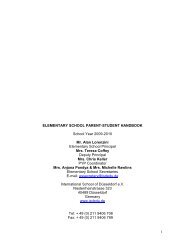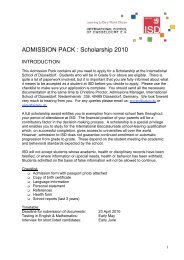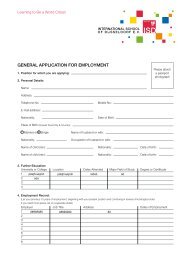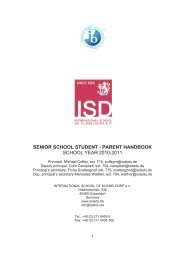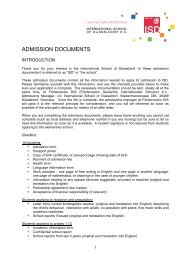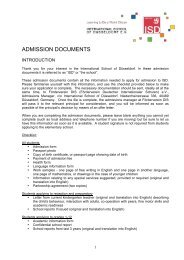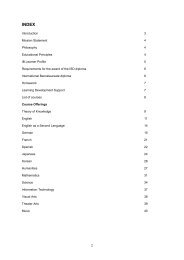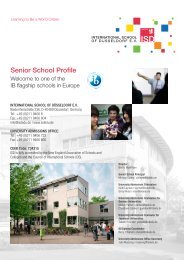Curriculum Handbook 2012-2013 Grades 11-12 - International ...
Curriculum Handbook 2012-2013 Grades 11-12 - International ...
Curriculum Handbook 2012-2013 Grades 11-12 - International ...
Create successful ePaper yourself
Turn your PDF publications into a flip-book with our unique Google optimized e-Paper software.
SPANISH<br />
IB DP Spanish B Ab Initio<br />
This course is studied at the standard level, over two years, by <strong>11</strong> th and <strong>12</strong> th grade<br />
students who have had no previous experience of learning Spanish. It meets the<br />
needs of IB diploma students who have had little or no opportunity for foreign<br />
language study previously, and are therefore unable to fulfil the IB diploma<br />
requirements for group 2; it is also open to students who are interested in learning a<br />
new foreign language as part of their IB diploma, possibly in addition to language A2<br />
or B.<br />
The aims of the course are to:<br />
• Develop students’ ability to communicate in speech and writing to enable them<br />
to deal adequately with familiar and practical needs.<br />
• Introduce students to the culture of Spanish-speaking countries.<br />
• Provide students with a foundation for further study of Spanish.<br />
• Provide intellectual stimulation.<br />
• Encourage positive attitudes to the learning of other languages, and to their<br />
speakers and countries.<br />
The course is communicative: it focuses primarily on interaction between speakers<br />
and writers of Spanish. The main aim is to prepare the learner to use the language<br />
appropriately in a range of situations and contexts, and for a variety of purposes.<br />
The skills of listening, speaking, reading and writing will be taught and developed<br />
through the study of a wide range of oral and written texts of different styles and<br />
registers. Equal emphasis will be given to the teaching of the four skills, and<br />
authentic material will be used whenever possible, the teaching of the language<br />
functions, the related grammar, and vocabulary will be integrated with the study of<br />
the topics.<br />
The course is learner-cantered and takes into account the interests, needs and<br />
social context of the learning group.<br />
IB DP Spanish B, SL <br />
This course aims to enrich students’ linguistic and cultural acquisition and<br />
development after having completed 3 to 4 years of Spanish. In an integrated and<br />
comprehensive approach, all four language learning vehicles – speaking, listening,<br />
reading and writing – are incorporated into a programme which stresses three main<br />
focuses woven into the curriculum. These are language, cultural interaction and<br />
message.<br />
Objectives:<br />
The student should:<br />
• understand and use Spanish in diverse oral and written contexts<br />
• gain a deeper understanding and appreciation of the diverse Spanish-speaking<br />
population through the study of texts and social interaction<br />
22<br />
1. develop students’ intercultural understanding / develop the students´ awareness<br />
of the German culture and to encourage them to compare, understand, and<br />
respect the differences between the German culture and their own.<br />
2. enable students to understand and use the language they have studied in a<br />
range of contexts and for a variety of purposes<br />
3. encourage, through the study of texts and through social interaction, an<br />
awareness and appreciation of the different perspectives of people from other<br />
cultures<br />
4. develop students’ awareness of the role of language in relation to other areas of<br />
knowledge<br />
5. develop students’ awareness of the relationship between the languages and<br />
cultures with which they are familiar<br />
6. provide students with a basis for further study, work and leisure through the use<br />
of an additional language<br />
7. provide the opportunity for enjoyment, creativity and intellectual stimulation<br />
through knowledge of an additional language<br />
IB DP German A Language & Literature SL/HL<br />
This two-year course is designed for students who aim either at the higher or<br />
standard level examination of IB German A Language & Literature. It affords<br />
candidates from a variety of backgrounds ranging from a high level of competence<br />
(near native) in German as a second language to native level.<br />
The course aims to develop in students skills of textual analysis relating to both<br />
literary and non-literary texts. An understanding of the ways in which formal<br />
elements are used to create meaning in a text is combined with an exploration of<br />
how that meaning is affected by reading practices that are culturally defined and by<br />
the circumstances of production and reception.<br />
A wider aim of the course is the development of an understanding of “critical literacy”<br />
in students.<br />
In view of the international nature of the IB and its commitment to intercultural<br />
understanding, the language A: Language & Literature course does not limit the<br />
study of texts to the products of one culture or of the cultures covered by any one<br />
language. The study of literature in translation from other cultures is especially<br />
important to IB Diploma Programme students because it contributes to a global<br />
perspective, thereby promoting an insight into, and understanding of, the different<br />
ways in which cultures influence and shape the experiences of life common to all<br />
humanity.<br />
The aims of language A: language and literature are to:<br />
1. introduce students to a range of texts from different periods, styles and genres<br />
2. develop in students the ability to engage in close, detailed analysis of individual<br />
texts and make relevant connections<br />
3. develop the students’ powers of expression, both in oral and written<br />
communication<br />
4. encourage students to recognize the importance of the contexts in which texts<br />
are written and received<br />
5. encourage, through the study of texts, an appreciation of the different<br />
perspectives of people from other cultures, and how these perspectives<br />
construct meaning<br />
6. encourage students to appreciate the formal, stylistic and aesthetic qualities of<br />
texts<br />
19



